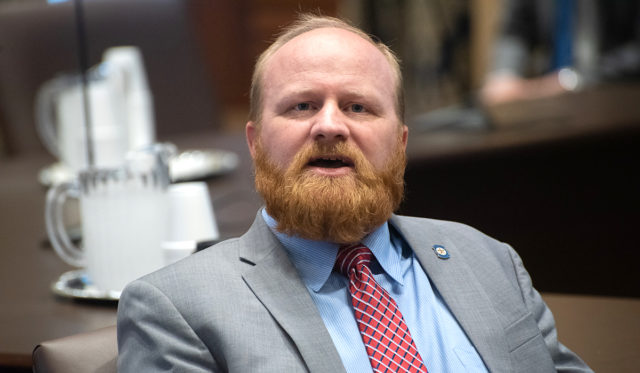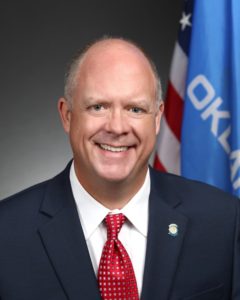

Oklahoma lawmakers are in the process of re-creating the durable health care power of attorney statutes they accidentally deleted last year.
Earlier this month, HB 3815 passed the House 90-0 and SB 1596 passed the Senate 41-3. The identical 46-page bills by Sen. Brent Howard (R-Altus) and Rep. Preston Stinson (R-Edmond) would allow Oklahoma citizens to specify in advance certain decisions about their health care in the event they become temporarily or unexpectedly incapacitated.
The bills became necessary this legislative session after HB 2548 was signed into law last year to rewrite the Uniform Power of Attorney Act, a general law governing all power of attorney designations and placing them in line with guidelines in other states. But there was one problem: Section 46 of HB 2548, which repealed the old Uniform Power of Attorney Act, also repealed the statute authorizing citizens to designate power of attorney for general health care decisions in Oklahoma.
“They wanted to bring our power of attorney into conformity with a bunch of others states that follow the Uniform Power of Attorney (Act). In doing so, they inadvertently deleted the durable health care power of attorney (law), which several of the other states had this other body of law that fixed this problem,” Stinson said. “Nobody realized that we didn’t have that body of law to fall back on. So [the priority this year] was to come back in and put that back in place for the hospitals and estate planning attorneys and everybody else who counts on that.”
For Howard, the saga has enforced an old legislative adage: The quickest way to create new law is to repeal old law.
“The main thing I’m learning through it is to look at the repealers. This was repealing the old Uniform Durable Power of Attorney Act, which was no longer uniform because they had stuck this as the only place to do a health care power of attorney,” said Howard, who was first elected in 2018. “So the lesson that I’m going to learn for it is to read every repealer and don’t take it for granted that the act is what it says it was or originally was. There could be changes that happened over the intervening 15 or 30 years.”
Stinson, who was first elected in 2020, learned a different lesson: Be careful letting legislative colleagues put your name on a bill.
“I was out last year when this passed. It was run in my name, but I was actually not here,” said Stinson, who missed most of the 2021 session recovering from a health issue. “I knew I was going to be out because I was having surgery last year, so I didn’t have a full slate of bills to run, and some other folks had more than they could handle. They said, ‘Hey, do you mind if we run one of these with your name on it?’ I said, ‘No, as long as it doesn’t make anybody mad or get me on the front page of the paper.’ They assured me it wouldn’t, but lo and behold.”
Howard: ‘It wasn’t an emergency’
Gov. Kevin Stitt signed HB 2548 on April 28 last year. Within a week, word spread among health care and legal industry lobbyists that the repealed statute authorizing health care power of attorney designations posed a problem. NonDoc asked multiple legislators whether the repealed statute needed to be replaced, but opinions differed on the actual impact, and none said the issue required attention at the end of the 2021 session.
“I don’t necessarily think that I said it wouldn’t cause a problem. It wasn’t the emergency that it was made out to be. There were a couple of articles that said that Oklahomans wouldn’t be able to nominate anyone to act on their behalf. Well, that wasn’t true,” Howard said this March. “They could use a proxy, but the problem with the proxy was that you have to have two doctors certify that you are unable to make a decision, whereas with the power of attorney you can just nominate immediately.”
Unlike last year’s bill, HB 3815 and SB 1596 contain “emergency clauses” that would cause the bills to take effect upon the governor’s signature.
Howard said legislators always “intended to fix” the mistake.
“It wasn’t an emergency that had to be addressed immediately. So I’m glad that we are able to get [these new bills] in place,” he said. “I think that it offers those opportunities for any Oklahoman to nominate who they want to act on their behalf for medical decisions that they otherwise could have made. And hospitals like it because it doesn’t require physicians having to certify that [patients] are absolutely unable to make those decisions.”
Sandra Harrison, vice president of regulatory and legal affairs for the Oklahoma Hospital Association, praised the two bills attempting to re-create the health care power of attorney statue.
“Oklahomans need a method by which they can choose someone to serve as a power of attorney for the purpose of making health care decisions,” Harrison said. “SB 1596 and HB 3815 reinstate the durable power of attorney (DPOA) for health care decisions by creating the Oklahoma Health Care Agent Act, giving individuals the option to assign an agent to make health care decisions for them when they no longer have capacity to make those health care decisions themselves. This decision-making ability is especially important when a person is hospitalized.”
Howard and Stinson said estate planning attorneys and the American Association of Retired Persons also asked that the Legislature re-create the statute it accidentally deleted.

“There’s been a problem with estate planning attorneys not be able to do their estate plans in a way that fully matches their wishes,” Stinson said. “There has been some concern on the part of hospitals that, without a valid document, they don’t know who has the authority to make determinations when somebody becomes incapacitated. There have been some concerns by some other folks that maybe this was an attempt to take away people’s right to make self-determinations on health care decisions.”
Stinson said that was not the intention or impact of last year’s bill.
“There was still the advanced directive, but that’s tailored really more toward specifically end-of-life care decisions,” he said. “Whereas the durable power of attorney had a broader tool set that allowed things where, if somebody was temporarily in a coma but expected to survive, it wouldn’t necessarily trigger the advanced directive, but a durable power of attorney would be able to step in and make health care decisions for that person.”
Stinson said the durable health care power of attorney practice allows for “care decisions” that an advanced directive does not cover.
“Like, if I have to go to a long-term care facility, these are the ones I’d want to go to,” Stinson said as an example.
Howard, an attorney who works in estate planning, said last year’s bill had been proposed in 2019 and 2020 as well, but it failed during those sessions. He said updating the state’s Uniform Power of Attorney Act was important and that recreating the health care power of attorney statutes this year will make things easier for hospitals, nursing homes, estate planning attorneys and seniors in general.
“People don’t really think about it until typically an issue arrises in their personal life, and unfortunately a lot more of those happen the older you get,” Howard said.




















